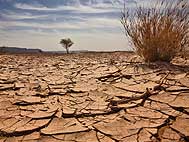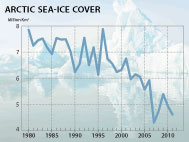| SEARCH |
-

Nov 17, 2015
Reflections on a three-decade legacy
The International Geosphere-Biosphere Programme (IGBP) will come to a close at t...
-
Nov 17, 2015
Use of and access to content on this website
Text and images produced by IGBP in house are free to use with appropriate credi...
-
Nov 12, 2015
Bella Gaia performance and panel discussion to mark IGBP's closure
A musical performance by Bella Gaia will celebrate the achievements and legacy o...
-

Towards Future Earth:
evolution or revolution?
During its three decades of existence, the International Geosphere-Biosphere Pro...
-
A personal note on IGBP and the social sciences
Humans are an integral component of the Earth system as conceptualised by IGBP. João Morais recalls key milestones in IGBP’s engagement with the social sciences and offers some words of advice for Future Earth.
-
IGBP and Earth observation:
a co-evolution
The iconic images of Earth beamed back by the earliest spacecraft helped to galvanise interest in our planet’s environment. The subsequent evolution and development of satellites for Earth observation has been intricately linked with that of IGBP and other global-change research programmes, write Jack Kaye and Cat Downy .
-
Deltas at risk
Around 500 million people worldwide live on deltas, but many of the world's deltas are sinking due ...
-
Climate change: the state of the science
A new data visualization released on the first day of the plenary negotiations at the UNFCCC’s clima...
-
Climate Change:
the State of the Science
Videos now online from the Stockholm public forum to mark the launch of the IPCC's climate report, 2...

History
of global-change research
Facts
There are four major international global-change programmes:
- DIVERSITAS
- International Geosphere-Biosphere Programme
- International Human Dimensions Programme
- World Climate Research Programme
World Climate Research Programme
As the seventies progressed, scientists became increasingly concerned about the the potential impact of humans on Earth's climate. In 1979, a group of scientists led by Swedish meteorologist Bert Bolin set up an international programme, the World Climate Research Programme (WCRP) to determine whether the climate was changing, whether climate could be predicted and whether humans were in some way responsible for the change. The programme was sponsored by the World Meteorological Organization and the International Council for Science (ICSU).
International Geosphere-Biosphere Programme
Throughout the eighties, evidence mounted that climate change was one part of a larger phenomenon, global change. In 1987, a team of researchers led, again, by Bert Bolin, James McCarthy, Paul Crutzen, H.Oeschger and others, successfully argued for an international research programme to investigate global change. This programme, sponsored by ICSU, is the International Geosphere-Biosphere Programme (IGBP). The programme has eight projects investigating different parts of the Earth system and links between them.
Intergovernmental Panel on Climate Change
After several years negotiating, Bert Bolin and colleagues argued successfully for the establishment of an Intergovernmental Panel on Climate Change (IPCC), launched in 1988. Bolin and colleagues believed that the two global change programmes, WCRP and IGBP should coordinate and conduct the science, but the science should be assessed independently.
IGBP and WCRP, as international leaders in global-change research work closely with the IPCC. We hold joint meetings, join scoping meetings, suggest authors and reviewers and comment on drafts. Over 80 scientists involved in the IGBP community contributed to the 2007 IPCC Fourth Assessment Report.
The independent review of IGBP stated that IPCC owes much of its success to the work of IGBP and WCRP.
A new era in Earth system science
IGBP, WCRP and a third programme, the International Human Dimensions Programme (IHDP, founded in 1996), spearheaded a landmark science conference held in Amsterdam in 2001. The conference, Challenges of a Changing Earth: Global Change Open Science Conference, led to the Amsterdam Declaration:
“In addition to the threat of significant climate change, there is growing concern over the ever-increasing human modification of other aspects of the global environment and the consequent implications for human well-being."
"Basic goods and services supplied by the planetary life support system, such as food, water, clean air and an environment conducive to human health, are being affected increasingly by global change.”[3]
The declaration goes on to say, “The international global-change programmes urge governments, public and private institutions and people of the world to agree that an ethical framework for global stewardship and strategies for Earth System management are urgently needed.”
Since the Amsterdam conference another international programme focusing on biodiversity has been set up, DIVERSITAS. These programmes form the Earth System Science Partnership.
In 2012, these international programmes plan another major science conference in London, Planet Under Pressure: new knowledge towards solutions.
IGBP closed at the end of 2015. This website is no longer updated.
-

Global Change Magazine No. 84
This final issue of the magazine takes stock of IGBP’s scientific and institutional accomplishments as well as its contributions to policy and capacity building. It features interviews of several past...
-

Global Change Magazine No. 83
This issue features a special section on carbon. You can read about peak greenhouse-gas emissions in China, the mitigation of black carbon emissions and the effect of the 2010-2011 La Niña event on gl...
-
INTERGOVERNMENTAL PANEL ON CLIMATE CHANGE:
How green is my future?
UN panel foresees big growth in renewable energy, but policies will dictate just how big.
-
UK:
'The Anthropocene: a new epoch of geological time?'
Royal Society, Philosphical Transactions A




















